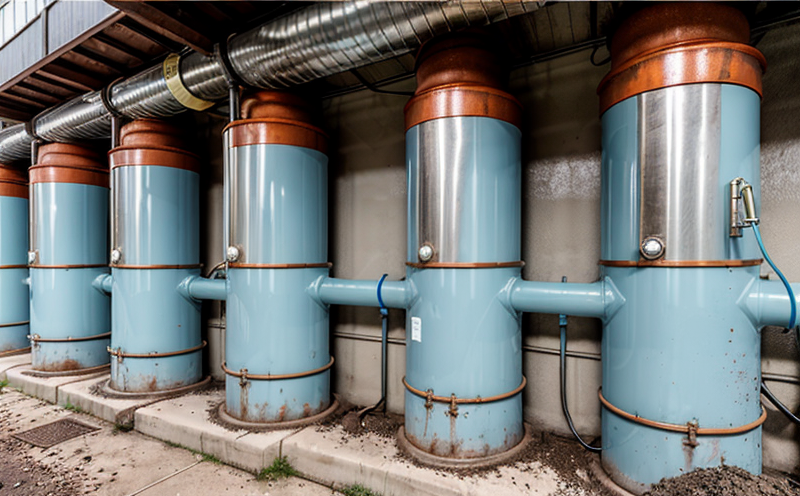ASTM G96 Scaling Tendency Test in Water Systems
The ASTM G96 Scaling Tendency Test is a critical procedure used to determine the potential for scaling formation in water systems. This test simulates conditions under which calcium carbonate (CaCO3) may precipitate out of solution, leading to scale deposits. Scale buildup can cause significant issues within water systems, including reduced heat transfer efficiency, increased energy consumption, and accelerated corrosion rates.
This method is particularly important for the water & wastewater testing sector where maintaining optimal operating conditions is paramount. By predicting scaling tendencies, this test helps in selecting appropriate materials, additives, or treatment methods that can mitigate these issues before they become operational problems.
The ASTM G96 Scaling Tendency Test involves subjecting water samples to controlled heating and cooling cycles while monitoring the formation of scale deposits. The test is conducted using standardized apparatus designed to mimic real-world conditions as closely as possible. Specimens are prepared by dissolving various salts in deionized water, which then undergoes temperature cycling between 60°C and 95°C over a period of several days.
The primary outcome measure is the amount of calcium carbonate scaling formed during these cycles, expressed as grams per liter (g/L). This value provides valuable information about the potential for scale formation in different water systems. Understanding this parameter allows engineers to design more efficient and durable systems capable of withstanding harsh operational environments without compromising performance or longevity.
The ASTM G96 Scaling Tendency Test also plays a crucial role in quality assurance programs aimed at ensuring consistent product performance across various manufacturing facilities worldwide. By using standardized protocols like those outlined in ASTM G96, companies can ensure their products meet stringent industry standards and regulatory requirements.
Furthermore, this test is instrumental in research and development efforts focused on improving water treatment technologies. Researchers can use the results from ASTM G96 to identify areas where improvements are needed or explore new approaches that could reduce scaling formation altogether.
In summary, the ASTM G96 Scaling Tendency Test provides essential insights into the likelihood of scale deposition within water systems. Its ability to predict potential problems allows for proactive measures to be taken early on, thereby preventing costly repairs and downtime later down the line.
Eurolab Advantages
When it comes to conducting ASTM G96 Scaling Tendency Tests, Eurolab offers several advantages that set us apart from other laboratories:
- Expertise and Experience: Our team of professionals brings years of experience in water & wastewater testing. We stay updated with the latest advancements in analytical techniques and standards.
- Accurate Results: Using state-of-the-art equipment and rigorous quality control measures ensures that our results are accurate, reliable, and repeatable.
- Comprehensive Reporting: Beyond just numerical data, we provide detailed reports that explain the implications of your test results. This helps you make informed decisions about improving your water systems.
- Dedicated Customer Support: Our clients receive personalized attention from our experienced staff members who are always available to answer questions and provide guidance throughout the testing process.
Choose Eurolab for all your ASTM G96 Scaling Tendency Testing needs. Trust us to deliver precise, dependable results that meet or exceed expectations.
Why Choose This Test
- Predictive Capability: The ASTM G96 test allows you to predict the likelihood of scaling formation in your specific water system. With this knowledge, you can take preventive measures early on rather than dealing with costly repairs later.
- Material Selection: By understanding how different materials interact with your water supply under various conditions, you can select the most suitable materials for constructing or repairing your systems.
- Treatment Optimization: The test helps optimize treatment processes by identifying which methods are effective in minimizing scale formation. This leads to more efficient operations and reduced operational costs.
- Regulatory Compliance: Ensuring compliance with relevant regulations is easier when you have reliable data from tests like ASTM G96. It demonstrates your commitment to maintaining high standards of quality control.
- Research Opportunities: For those engaged in R&D, the ASTM G96 test offers a platform for exploring innovative solutions that could revolutionize water treatment technology.
These benefits make the ASTM G96 Scaling Tendency Test an indispensable tool for maintaining robust and efficient water systems. Contact us today to learn more about our services or schedule a consultation with one of our experts.
International Acceptance and Recognition
The ASTM G96 Scaling Tendency Test is widely accepted across numerous industries, including manufacturing, construction, and utilities. Its international recognition stems from its alignment with global best practices in water management and quality assurance.
- Australia: The Australian Standards Association recognizes ASTM G96 as a standard method for assessing scaling tendencies. Compliance ensures products meet local regulatory requirements.
- European Union: EU directives often reference ASTM methods, making the G96 test essential for companies operating within this region.
- New Zealand: Similar to other developed nations, New Zealand relies on internationally recognized standards like ASTM G96 when specifying quality criteria for water systems.
- United States: The American Society for Testing and Materials (ASTM) is a leading organization that sets numerous industry standards. ASTM G96 enjoys broad acceptance among U.S.-based organizations involved in water & wastewater management.
The widespread adoption of ASTM G96 reflects its value as a benchmark tool for assessing scaling tendencies accurately. Whether you're looking to comply with local regulations or participate in international trade, choosing this test demonstrates your commitment to excellence and reliability.





